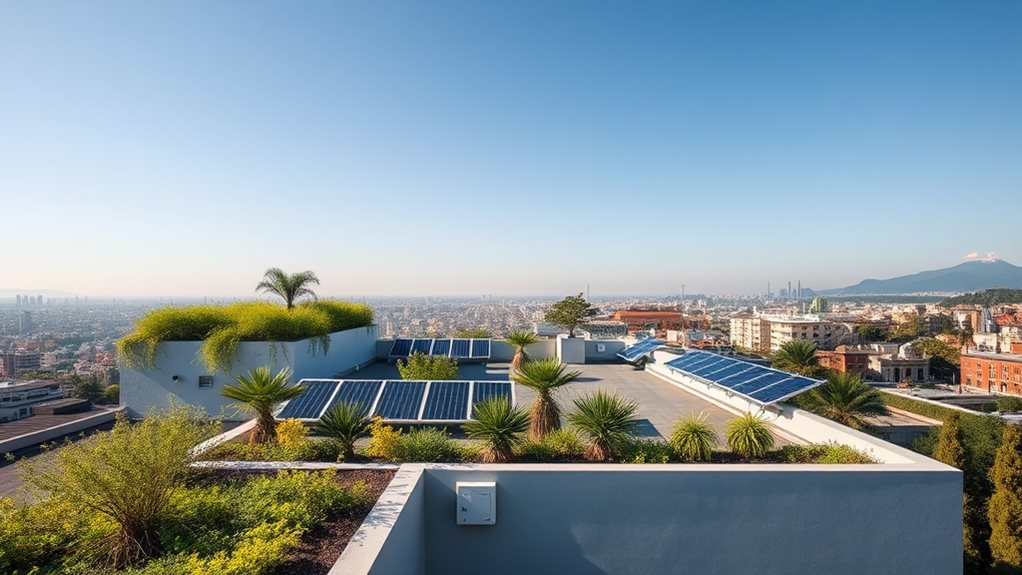Consider how you can revolutionize the hospitality sector by adopting sustainable construction practices. By integrating green technologies and leveraging renewable energy, you minimize environmental impact while enhancing guest satisfaction. Focus on water conservation with rainwater harvesting and greywater recycling systems. Utilize recycled materials and local resources for eco-friendly construction. These practices not only reduce your carbon footprint but also foster a culture of environmental responsibility. What innovative strategies will you implement next?
Sustainable building practices are gaining traction in the hospitality industry, reducing environmental impact and enhancing the guest experience. Learn about the latest trends and innovations in green building with Fantabettiamo.

Embracing Green Technologies in Hotel Design
How can hotels effectively integrate green technologies into their design? You can start by implementing smart lighting systems.
These systems optimize energy consumption by adjusting lighting based on occupancy and natural light availability. Not only does this innovation cut energy costs, but it also reduces the carbon footprint, aligning with sustainable goals.
Next, consider incorporating indoor gardens.
These gardens enhance air quality by absorbing carbon dioxide and releasing oxygen, creating a healthier environment for guests. They also offer a visually appealing natural element, promoting relaxation and well-being.
The Role of Renewable Energy in Hospitality
Incorporating green technologies lays a solid foundation for sustainable hotel design, yet to truly advance eco-friendly initiatives, hotels must harness the power of renewable energy. By integrating solar power, you can transform rooftops into energy-generating assets.
Solar panels capture sunlight, converting it into electricity, greatly reducing reliance on non-renewable sources. This shift not only slashes carbon emissions but also enhances energy efficiency, cutting operational costs.
Moreover, implementing solar thermal systems can efficiently heat water, a major energy consumer in hospitality. By utilizing photovoltaic cells, you guarantee steady energy supply even during peak demands.
Embracing these innovative solutions positions your hotel as an environmental leader, meeting guests’ growing expectations for sustainability while safeguarding the planet’s resources for future generations.
Water Conservation Strategies for Resorts
While addressing the pressing need for sustainable water management, resorts can adopt innovative strategies to conserve this precious resource.
You can implement rainwater harvesting systems, capturing and storing rainfall for non-potable uses like irrigation and toilet flushing. This reduces reliance on local water supplies and mitigates stormwater runoff.
Additionally, integrating greywater recycling systems allows you to treat and reuse wastewater from showers and sinks for landscape irrigation or cooling systems. By doing so, you not only decrease freshwater demand but also reduce the energy needed for water heating and treatment.
These solutions require precise engineering and maintenance, ensuring efficiency and sustainability. By prioritizing these strategies, you’ll contribute considerably to environmental conservation and operational cost savings, setting a benchmark for sustainable hospitality.
Innovative Use of Recycled and Sustainable Materials
As resorts advance their sustainable water management, attention turns to the innovative use of recycled and sustainable materials in construction and renovation.
Embracing recycled textiles, you can considerably reduce waste and energy consumption. These materials, repurposed into insulation or acoustic paneling, offer both environmental benefits and aesthetic appeal.
Sustainable furniture crafted from reclaimed wood or eco-friendly composites not only enhances your resort’s green credentials but also provides durable and stylish options for guests.
Opt for local sourcing to lessen transportation emissions, further bolstering sustainability.
Overcoming Challenges in Implementing Eco-Friendly Practices
Steering through the complexities of implementing eco-friendly practices in the hospitality industry requires both strategic planning and innovative thinking.
You need to focus on staff training to guarantee everyone is equipped with the knowledge and skills to execute sustainable initiatives effectively. This involves regular workshops and practical demonstrations on energy conservation, waste management, and sustainable resource use.
Engaging your guests is equally important.Implement interactive programs that encourage them to participate in your eco-friendly efforts, such as recycling challenges or energy-saving tips during their stay. This not only enhances guest experience but also builds a community around sustainability.